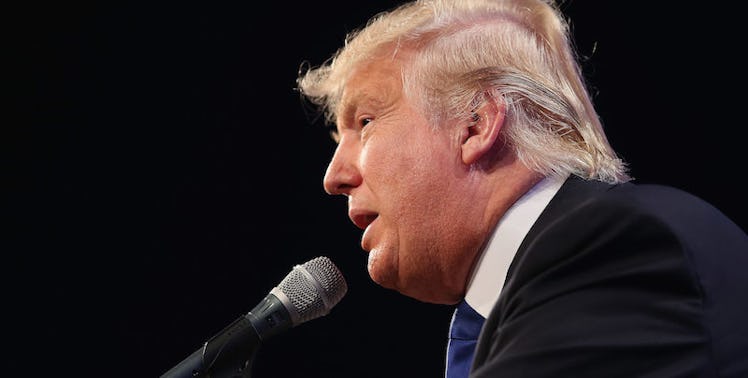
Politicians Keep Blaming Mental Health For Gun Violence
Less than 12 hours after a gunman opened fire at Umpqua Community College in Roseburg, OR, killing 10 people, the leading Republican presidential candidates wrote the tragedy off as a mental health issue.
On Thursday afternoon, Donald Trump told the Washington Post:
It sounds like another mental health problem. So many of these people, they're coming out of the woodwork. We have to really get to the bottom of it.
And in an interview with Hugh Hewitt, Ben Carson said:
Obviously there are going to be those calling for gun control but that happens every time we have one of these incidents. Obviously that’s not the issue. The issue is the mentality of these people. And we need to be looking at the mentality of these individuals and seeing if there are any early warning clues that we can gather that will help us as a society be able to identify these people ahead of time.
After the Emanuel AME shooting in Charleston, SC in June, Jeb Bush said:
I'd also say going forward that these cases -- that the race system in Charleston or these cases of people who are just mentally deranged -- we as a society better figure out how we identify these folks long before they feel compelled to take up a gun and kill innocent people.
Although mental health is often a factor in mass shootings, lax laws are what literally allow people to purchase machines of violence that they use to kill innocent men and women across the United States.
The UCC gunman had 13 firearms, all of which were purchased legally either by himself or family, the Bureau of Alcohol, Tobacco, and Firearms reported on Friday.
The gunman who killed two people in a movie theater in Lafayette, LA, this summer legally purchased the gun.
James Holmes, who last month was sentenced to life in prison without parole for 12 murders in an Aurora, CO, movie theater committed in 2012 legally purchased four guns.
Dylann Roof, the Emanuel AME shooter, should not have been legally able to purchase the gun he used, but got it due to a clerical error.
Many 2016 presidential candidates -- namely Republican candidates, although Bernie Sanders doesn’t have the best record on gun control either (sorry #YourFavIsProblematic) -- have been continually responding to questions about gun control with answers about mental health.
Of course, mental health is a major issue and deserves federal attention and funding, but candidates are using it as an excuse to avoid gun control.
Politicians are quick to blame mental health and outliers for mass shootings and then act angry and defensive when someone brings up laws.
This is especially intriguing where it concerns Governor Chris Christie. New Jersey put in strict gun laws and has a low gun death rate. When asked if that rate is due to laws, though, Christie said:
No, that's because they have a governor who enforces the law and also supports community policing.
In an address on the UCC shooting yesterday, President Obama urged citizens to pay attention to gun control in the upcoming election, saying:
[Changing laws] will require that the American people, individually, whether you are a Democrat or a Republican or an independent, when you decide to vote for somebody, are making a determination as to whether this cause of continuing death for innocent people should be a relevant factor in your decision. If you think this is a problem, then you should expect your elected officials to reflect your views.
No Republican candidate fully supports tighter gun control. Most defend gun ownership.
On the other side, Hillary Clinton has been about gun control and is still about it.
Martin O’Malley strongly supports tighter gun control and introduced that legislature in Maryland. He even called people out for tweeting about mass shootings while doing nothing to actually help prevent them.
Ultimately, putting the focus on mental health rather than gun control is doubly harmful. It does nothing to keep weapons out of the hands of people who want to commit horrific violence, and it reinforces a stereotype that mental illness is always linked to violence.
There have been 45 gun incidents in schools since the start of 2015. It’s time to stop insisting mental illness, and not legal access to machines explicitly designed to inflict harm, is causing this destruction.